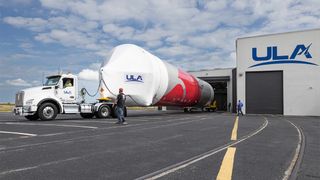United Launch Alliance's 1st Vulcan Centaur rocket arrives in Florida for debut flight
The next-gen Vulcan Centaur rocket will launch Amazon's Kuiper satellites and the private Peregrine moon lander for Astrobotic on its debut mission.

The first of a new generation of United Launch Alliance rockets has arrived at its Florida spaceport to prepare for a debut flight.
United Launch Alliance (ULA) engineers unloaded the first Vulcan Centaur rocket on Sunday (Jan. 22), rolling it off the company's RocketShip barge and onto dry land at Port Canaveral near its launch site, Cape Canaveral Space Force station. The new rocket will make its first flight in the next few months, if all goes according to plan, sending a private lunar lander to the moon alongside two Amazon internet satellites.
"The first flight items shipped include the Vulcan booster first stage interstage adapter and Centaur V upper stage," ULA officials wrote in a statement. "The hardware was transferred from RocketShip to ULA facilities at Cape Canaveral for post-arrival inspections and the start of launch preparations." The RocketShip barge delivered the Vulcan Centaur components from ULA's rocket factory in Decatur, Alabama.
#VulcanRocket booster is a beaut! pic.twitter.com/YSdClYutsnJanuary 22, 2023
Vulcan Centaur is a 202-foot-tall (67 meters) booster designed to replace ULA's workhorse Atlas V and Delta IV rockets for commercial and government missions. The rocket is equipped with a Centaur V upper stage and up to six solid rocket boosters to power its way to space. Its first stage is powered by two BE-4 methane-liquid oxygen engines built by Blue Origin.
Make way, rocket coming through. #VulcanRocket #CountdowntoVulcan pic.twitter.com/pVCtUHbsRGJanuary 22, 2023
"Make way, rocket coming through," ULA CEO Tory Bruno wrote on Twitter to celebrate the Vulcan Centaur's arrival. He also shared a time-lapse video of the booster's components rolling off the RocketShip barge.
"I don't know about you guys, but I just never get tired of seeing this," he added.
I don’t know about you guys, but I just never get tired of seeing this. #Rocketship. #CountdowntoVulcan pic.twitter.com/r0bL2qUghKJanuary 23, 2023
All elements of the first #VulcanRocket have arrived at Cape Canaveral to begin processing towards the inaugural test flight of ULA's next generation rocket in the #CountdownToVulcan. Learn more in our blog!https://t.co/jeWP7VtHx4 pic.twitter.com/xg4H78Bw1sJanuary 23, 2023
With its components in Cape Canaveral, the Vulcan Centaur rocket will undergo a series of checks and tests, and ultimately be assembled for flight at ULA's facilities at Cape Canaveral Space Force Station. Its first mission, targeted for the first quarter of this year, will launch two prototype internet satellites for Amazon's Project Kuiper and the Peregrine moon lander built by the company Astrobotic.
Get the Space.com Newsletter
Breaking space news, the latest updates on rocket launches, skywatching events and more!
"The Certification-1 launch will deliver two Project Kuiper demonstration satellites into low Earth orbit, place the Astrobotic Peregrine commercial lunar lander in a highly elliptical orbit more than 225,000 miles (360,000 km) above Earth to intercept the moon, and carry a Celestis Memorial Spaceflight Payload beyond the Earth-moon system to orbit the sun forever," ULA officials said.
Astrobotic's Peregrine lander will carry 24 payloads to the moon, including 11 for NASA as part of the agency's Commercial Lunar Payload Services project.
Email Tariq Malik at tmalik@space.com or follow him @tariqjmalik. Follow us @Spacedotcom, Facebook and Instagram.
Join our Space Forums to keep talking space on the latest missions, night sky and more! And if you have a news tip, correction or comment, let us know at: community@space.com.

Tariq is the Editor-in-Chief of Space.com and joined the team in 2001, first as an intern and staff writer, and later as an editor. He covers human spaceflight, exploration and space science, as well as skywatching and entertainment. He became Space.com's Managing Editor in 2009 and Editor-in-Chief in 2019. Before joining Space.com, Tariq was a staff reporter for The Los Angeles Times covering education and city beats in La Habra, Fullerton and Huntington Beach. In October 2022, Tariq received the Harry Kolcum Award for excellence in space reporting from the National Space Club Florida Committee. He is also an Eagle Scout (yes, he has the Space Exploration merit badge) and went to Space Camp four times as a kid and a fifth time as an adult. He has journalism degrees from the University of Southern California and New York University. You can find Tariq at Space.com and as the co-host to the This Week In Space podcast with space historian Rod Pyle on the TWiT network. To see his latest project, you can follow Tariq on Twitter @tariqjmalik.
